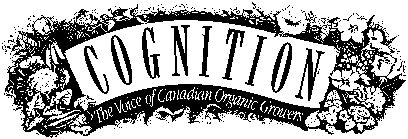

Cognition Index | Virtual Library
| Magazine Rack
Search
| Join the Ecological Solutions Roundtable
by Janette Haase
The Canadian government and Monsanto have been very quiet about the current status of rBGH, a bioengineered bovine growth hormone, also known as bovine somatotropin or BST. In the fall of 1995, a Danish dairy bulletin reported that Dr. R. Hacker of the University of Guelph had told European industry leaders that Monsanto would have enough animal health data to fulfill Health Canada requirements within six months; Hacker also said that resistance to rBGH in Canada is "petering out" and that there will be no reason to keep it off Canadian shelves.;
Meanwhile, the health effects on humans are still of great concern. Dr. Samuel Epstein of the University of Illinois released a paper in January of this year that critiques much of the existing research. The focus is on the insulin-like hormone, IGF-l, which is found in greatly increased levels in rBGH milk. There is controversy over the effects of pasteurization on IGF-l levels, the degree to which it can be absorbed in the gut of infants versus adults, and the role it plays in breast and gastrointestinal cancer. As well, in discussing Monsanto’s testing procedures, Epstein consistently finds them to be seriously flawed. He cites studies on rats that are only two weeks long; use of adult rats only; use of genetically engineered rather than natural IGF-1 in tests; conclusions that are in conflict with cited data; confusing and misleading presentation of data; and the withholding of critical test data. When rBGH was introduced in the U.S., use of antibiotics in dairy cows increased by 300%. In a 1995 article in the American Journal of Acupuncture, M. Van Benschoten raises concerns that widespread antibiotic residues in the foods we eat may be a major factor in the alarming increase in antibiotic-resistant strains of bacteria over the past decade.
In a letter to the National Farmer’s Union dated January 5, 1996, former Minister
of Agriculture Diane Marleau says she is waiting for further scientific information from
Monsanto before any decision can be made on rBGH. Ms Marleau is also very clear when she
says that "scientific evidence has been and will continue to be the only basis upon
which a decision respecting the [approval of] bST will be determined."
I question the value of this approach: Monsanto is either financing research or providing
research data for a product that it wants to see approved, and its track record, in my
opinion, is not one of honesty or integrity.;
Putting aside all of these concerns about the integrity of the review process, I believe Canadians must come to terms with some much broader issues. How do we insist that other criteria, such as ethical and socioeconomic issues, balance the decision-making process? I believe a system based only on science is inherently flawed and cannot, by its very nature, provide decisions that benefit all life on this planet. In Europe, there is a Citizen’s Committee on Biotechnology; perhaps we need something similar in Canada. Do we have the right to say we don’t want a product simply because we do not believe it is good for humans or for animals? Do we need to spend millions of dollars to be told that something we do not want or need is scientifically safe? Who is really benefitting from this review process? In the long term, consumer resistance to rBGH can kill the product regardless of its approval, but only if Canadians are allowed access to rBGH-free milk. Monsanto is clearly against any kind of labeling and has gone to great lengths to intimidate U.S. dairies that label their milk as rBGH-free. The Dairy Farmers of Canada are also against labeling if rBGH is approved; they don’t want to see their markets suffer. The recent introduction of organic milk in Ontario may prove very important in allowing consumers access to natural milk, should rBGH be approved.
I have received several calls in the past few months from people who want to become involved in the battle against this hormone. I have provided information and have been asked to speak at public meetings. I am willing to do this wherever possible. I can be contacted through the COGNITION editor.
Copyright © 1996.
Janette Haase.Reprinted with permission. All rights reserved.
Info Request | Services | Become EAP Member | Site Map
Give us your comments about the EAP site
Ecological Agriculture Projects, McGill University (Macdonald
Campus)
Ste-Anne-de-Bellevue, QC, H9X 3V9 Canada
Telephone:
(514)-398-7771
Fax:
(514)-398-7621
Email: info@eap.mcgill.ca
To report problems or otherwise comment on the structure of this site, send mail to the Webmaster